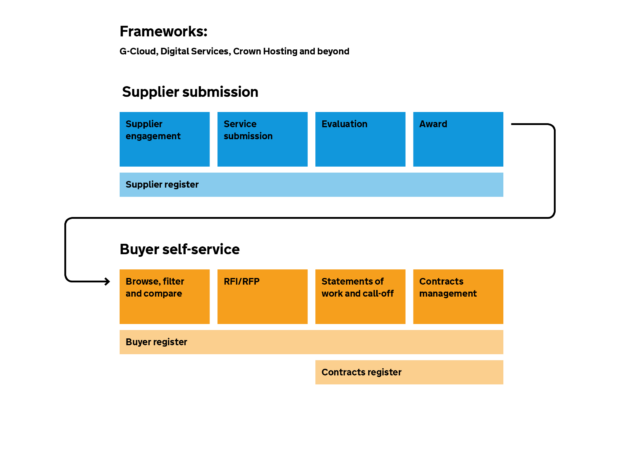I’m Head of Strategy for the Digital Marketplace, which is part of Government Technology in GDS. We’re helping people who are transforming public services by making it simpler, clearer, and faster for them to buy what they need.
We’re looking into lots of ways that we can do this, but we think that one of them is by opening up government procurement and contract data, and improving its quality.
Being open is best
I recently attended a workshop organised by the Open Contracting Partnership and talked about what the Digital Marketplace team is doing to make the end to end buying process digital by default, supporting improved disclosure of public contract data.
One of my slides illustrated these points:
 The aim of the workshop was to talk about potential UK government commitments to open contracting in its third Open Government Partnership (OGP) national action plan (NAP), which is due to be published in May 2016. The second NAP is due to be fully implemented by the end of 2015.
The aim of the workshop was to talk about potential UK government commitments to open contracting in its third Open Government Partnership (OGP) national action plan (NAP), which is due to be published in May 2016. The second NAP is due to be fully implemented by the end of 2015.
Why open contracting is so important
Increasing the transparency of public sector procurement and contracting is important because it:
- builds civil society’s trust in government
- reduces corruption and fraud, and helps detect collusive arrangements
- promotes an open and competitive market for a more diverse range of government suppliers and service providers, e.g. SMEs and voluntary or charitable organisations
- supports sustainable development in supply chains
- encourages innovation in supply
- increases collaboration within supply markets and with government
- leads to greater efficiencies in public sector procurement and contracting processes
- improves value for money to the taxpayer
I could go on.
Quality and availability of procurement and contracting data
I believe that, through its procurement and contracting practices, the public sector can deliver better services for citizens at a lower cost to the taxpayer. To help this, we need a quality set of procurement and contracting data. At GDS, we’d like to make that data a public asset.
UK government procurement policy wants to increase the accessibility of procurement and contract data to the public through Contracts Finder. This is a great start, and in addition we’re looking at how the Digital Marketplace can support implementation of the Open Contracting Data Standard (OCDS).
Open data in other countries
Other governments are also making progress on their commitments to open contracting. They’re developing legislation, policy, and public dashboards to increase transparency of their procurement and contract data.
Here are a few examples:
- Mexico and Paraguay are focussing on data analysis and visualisation
- the Czech Republic has approved procurement law following Slovakia’s example, where a government contract won’t be official until it’s published
- the Ukraine’s platform ProZorro claims to save 10-20% each tender
- Russia’s Clearspending platform gives access to contracts, grants, purchases and violations, and publishes infographics on state expenditure
- Vietnam has committed to implement open contracting principles, the OCDS, and improve its monitoring and evaluation of the procurement process
Public registers will help
Having authoritative, trusted lists or ‘registers’ of public sector buying organisations, and suppliers to the public sector, will be a major step towards improving data quality.
A recent blog post from the Open Data Institute (ODI) highlighted the need for some basic registers of information for the UK public sector, and listed the top five authoritative datasets they wanted to see from the UK government.
Two of these five registers are:
- buyers - every public sector body in the UK, from central government departments to county councils, transport authorities to schools
- suppliers - every organisation the UK public sector buys something from
We’re looking at how development of the Digital Marketplace can support GDS's work on registers.
Interactions between buyers and suppliers
I think there’s a real opportunity to improve the quality of data on procurement and contracting activity that takes place between public sector buyers and suppliers.
It’s the conduct, interactions, and decisions made between buyers and suppliers that are subject to legal obligations of fairness, openness, transparency, equal treatment, and non-discrimination of suppliers.
Improving the quality of this data and making it open by default will help the public know:
- who is doing what
- why they're doing it
- when it's being done
- when it's completed
- how much it cost
- when opportunities for new suppliers will open
We’re looking at how the Digital Marketplace can capture the data of these interactions between buyers and suppliers.
An exemplar of data quality and disclosure
Creating registers of buyers and suppliers, combined with quality data on procurement and contracting activity that’s published in an accessible, structured and repeatable way on Contracts Finder, will represent a paradigm shift in terms of transparency in these areas.
I think the Digital Marketplace could then be considered an exemplar of data quality and disclosure in public sector procurement and contracting.
Some things we’ll be looking at in 2016
Working with the Crown Commercial Service (CCS) we’ve started looking at creating simpler, clearer contracts with user-centred design. We’ve also been looking at how we can use the OCDS for the Digital Outcomes and Specialists framework.
We’ll iterate our approach to open contracting as we make more digital and technology products and services available through the Digital Marketplace.
As always, we’ll blog regularly about what we are learning along the way.
Follow Warren on Twitter, and don't forget to sign up for email alerts.

